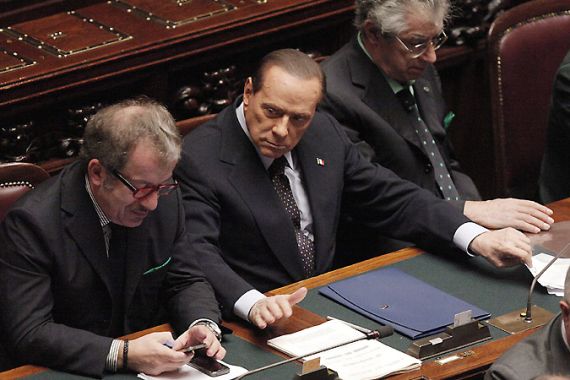Budget vote puts squeeze on Berlusconi
Crucial budget package passed but only due to opposition abstentions, exposing Italian PM’s lack of working majority.

Silvio Berlusconi’s grip on power in Italy appears increasingly tenuous after crucial budget measures were passed by Italy’s parliament only after opposition deputies abstained from the vote.
Following the vote, in which Berlusconi lost the support of both coalition allies and several deputies within his own party, the embattled prime minister met with the Italian president on Tuesday evening, Al Jazeera’s Tim Friend reported from Rome.
“Mr. Berlusconi left the office behind me here not long ago, made the short drive to the president’s office. He will sit down with the president and decide what the future might be,” our correspondent said.
Unless he agrees to resign, Berlusconi is likely to face a no-confidence vote on Wednesday or Thursday.
While Berlusconi, who has dominated Italian politics for two decades, has survived 50 no-confidence votes in the past, Friend said the huge pressure he faced this time was unlike anything he had encountered previously.
“He may think that he’s wily enough to make this one swing his way as well, but it’s looking less and less likely,” Friend said.
Italy faced enormous pressure from other eurozone nations over concerns that its huge debt mountain could drag down other economies and cause an even bigger crisis, our correspondent said.
Majority gone
Berlusconi’s government obtained only 308 votes on Tuesday, falling short of an absolute majority of 316 in the 630-seat lower house.
Pier Luigi Bersani, the leader of the centre-left opposition bloc whose abstentions ensured the budget measures were passed, immediately called on Berlusconi to resign, saying Italy ran a real risk of losing access to financial markets after yields on government bonds approached the red line of seven per cent.
“I ask you, Mr Prime Minister, with all my strength, to finally take account of the situation … and resign,” Bersani said immediately after the vote.
The prime minister’s closest coalition ally on Tuesday joined the chorus calling for the 75-year-old media magnate to quit.
Umberto Bossi, head of the Northern League, which has provided parliamentary support for Berlusconi throughout his political career, said he should be replaced by Angelino Alfano, secretary of the prime minister’s Popolo della Liberta (PDL) party.
“We asked the prime minister to stand down,” Bossi told reporters outside parliament.
| IN DEPTH | |||||||||||
|
Potential prosecution
Valentino Larcinese, a senior lecturer in the department of government at the London School of Economics, said that avoiding potential prosecution is one of the likely factors driving Berlusconi’s desire to cling on to power despite the shrinking support.
“There’s some good reasons [for Berlusconi] to hang onto power … this is a shelter,” he said. “He can face big troubles when he’s out of power.”
Berlusconi faces charges of alleged bribery, alleged fraud and for allegedly having paid for sex with a 17-year-old girl; charges he denies. He has fought to retain the legal immunity he achieved in a law his government passed in 2008.
Pressure mounts
Andrea Ingianni, an economist at London’s Kingston University, told Al Jazeera on Tuesday evening that the budget vote had done little to relieve the uncertainty hovering over financial markets.
“I think we’ve seen the markets panicking a bit … I’m pretty sure we’re going to see people betting on Italy defaulting at some point,” he said.
“Berlusconi is probably worried about his own future. But what we have to worry about now it Italy’s future,” Ingianni said.
Benchmark government bond yields – the rate at which governments can borrow money – hit a new record of 6.77 percent after the vote, the highest it has been since the euro single currency was established in 1999.
Many analysts say yields above seven per cent would make funding costs unsustainable for Italy’s huge public debt, one of the highest in the world. The surging bond yield is accompanied by a low growth rate and debt of $2.6 trillion.
Italy has the third biggest economy in the eurozone and its political turmoil and debt worries are seen as a huge threat in the wider crisis facing the single currency.
